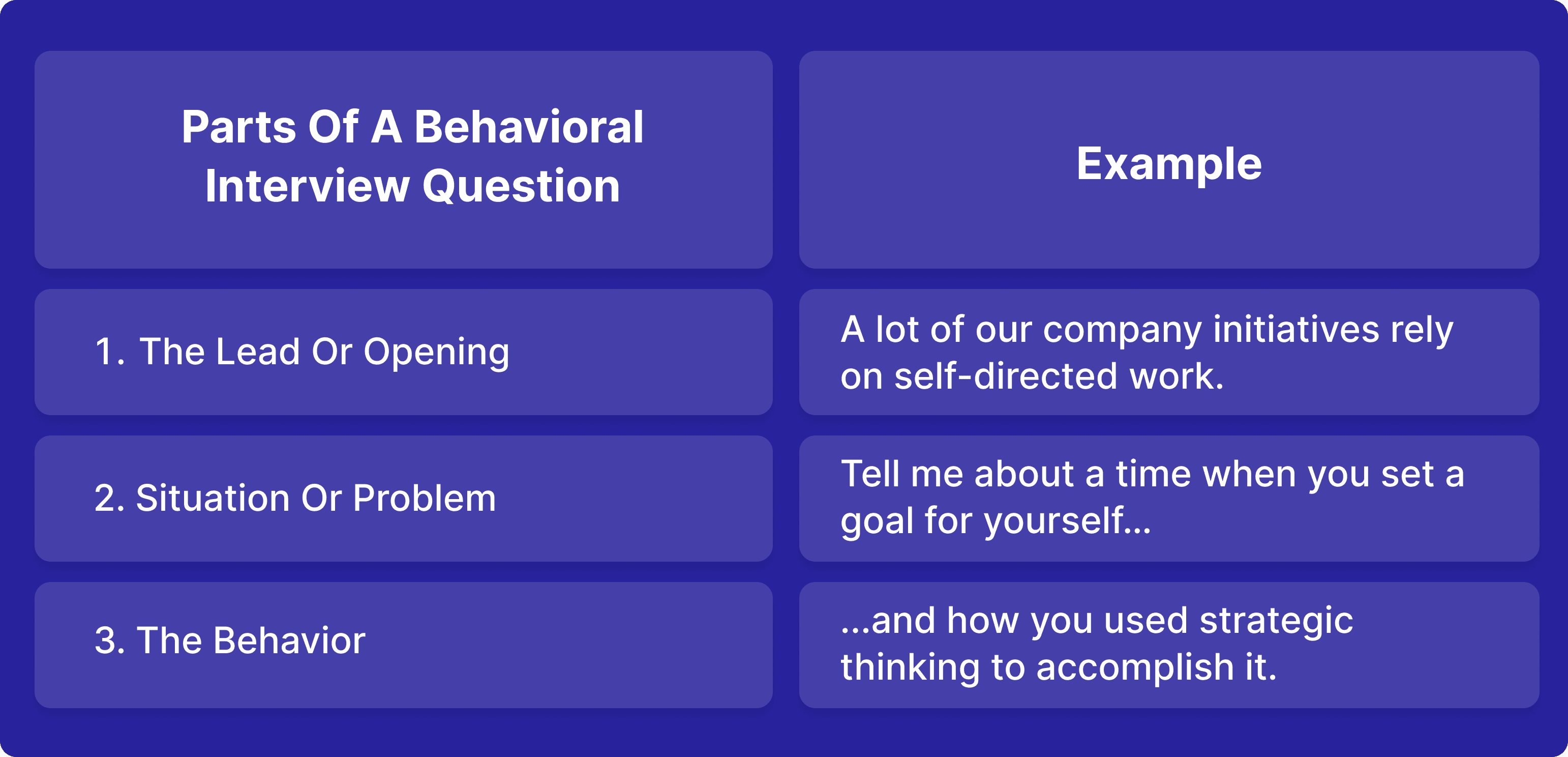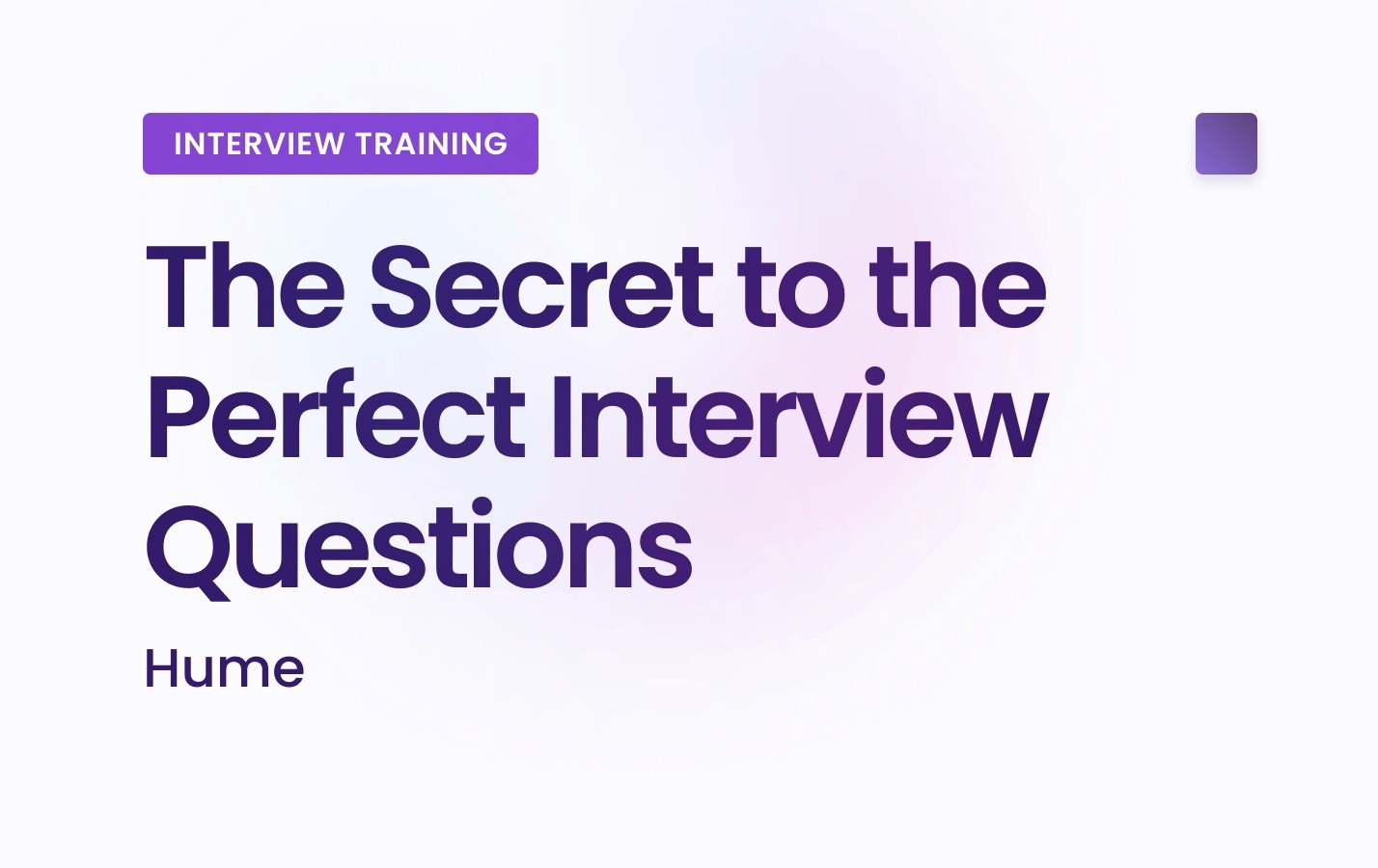The Secret to the Perfect Interview Questions: How to create the right behavioral interview questions

2023
Good hiring practices are essential to keeping recruiting, onboarding, and training costs low, as well as decreasing a company’s turnover rate, but the true impact of a bad hire extends beyond a mere dollar value. A bad hire can decrease customer service ratings and productivity, reduce company morale, increase spending on unsuccessful initiatives, or, worse, cause long-term legal problems. Bad hires can even adversely affect your organization by spreading negative word of mouth.
Luckily, the interview process gives you control over who fills your employee roster and who is chosen to become a member of your team. It is up to you to decide who is the best fit for the role and your company’s culture. At times, this responsibility can feel like more of a burden, especially if you’re not very confident in your interviewing strategies.
But fear not! When you’re conducting an interview, you don’t have to be the best interviewer (or a leading psychologist) in order to uncover and secure the best employees. You don’t have to know how to interpret subtle facial expressions. You don’t have to decide if the way a candidate ties his shoes means he’s well-suited to a managerial position. And you definitely shouldn’t feel pressured to make inferences (er, assumptions) about a person based on the information included on his or her resume.
It is actually far more important that you’re asking the right questions of the person you’re interviewing -- not trying to interpret or analyze their responses. The right questions will illuminate whether or not the candidate can actually perform -- and perform well -- in the job that you’re trying to fill. Moreover, the right questions will give you real insight into the applicant’s past performance, current behaviors, and future potential.
But how do you come up with the “right” interview questions? Which questions will effectively predict if a prospective employee is able to perform the job well -- or not? Is there a secret to creating the perfect interview question? And if there is, what is it?
The answer, you’ll soon find, lies in behavioral interview questions, or behavior-based interviewing. Research has shown that the rate of successful hires using traditional methods is just 19%, while with behavior-based interviewing, that percentage rises to 75%. Behavioral interview questions help you uncover a candidate’s approach to problems, conflict, and stress, as well as reveal if he or she shares the values that are vital components of your company’s culture.
In this article, we’ll define the behavioral interview method, discuss why and how it works, and talk through how you can adapt your company’s interview protocol to include behavioral interview questioning. We’ll also provide some helpful examples of behavioral interview questions and question stems that you can tailor to meet your company’s needs.
What are behavioral interview questions?
Behavioral interview questions are rarely declared in the form of a question. Instead, they contain three distinct parts and sound more like a statement. Behavioral interview questions intend to guide candidates into sharing a situation from their past and how they acted -- what they did, what they said, and what the outcome was.
Learning about a candidate’s prior actions gives you insight into the candidate’s past behavior, which is the entire goal of behavior-based interviewing. Past behavior is the best predictor of future behavior. After all, the best way to see whether someone can do a job successfully is to find out whether he or she has done it before, or at least done something similar, with great results.
When creating a behavioral interview question, construct it using the following three parts:
1. The lead or opening
This is the beginning of the sentence, or how the interviewer opens up the question. This usually includes a statement telling the candidate exactly what will be expected in this job.
2. The situation or problem
This is the scenario that the interviewer will present to the candidate in order to find out how he or she previously acted and may act in the future.
3. The behavior
In the lead and the situation or problem, the interviewer gives candidates an idea of what this job will require them to do. In the behavior part, towards the end, the interviewer states specifically what he or she is looking for in the candidates’ answers and then opens the floor to answers.
What’s interesting is that, although the interviewer is perhaps being overly transparent, many interviewees do not pick up on the cues they’re being given and instead just talk about a recent experience they had that matches the scenario from the question. They don’t explicitly discuss the specific behavior that the interviewer stated in the question.
This is useful to the interviewer because not only does it illuminate whether the desired behavior is present or not, but it also shows that the prospective employee may be missing some critical thinking and listening skills.
When the three parts of a behavioral interview question are put together, they usually sound something like this: “A lot of our company initiatives rely on self-directed work. Tell me about a time when you set a goal for yourself and how you used strategic thinking to accomplish it.”
If you wanted to break this example into its three parts, it would look something like this:
Parts of a Behavioral Interview Question

As you can see, the lead or opening sets the stage for the scenario and describes an exact skill requirement for the job. The situation or problem is when the interviewer prompts the prospective employee to share. And the behavior names the specific actions that the interviewer wants to see and hear reflected in the interviewee’s response.
Now that you know how to create a behavioral interview question, you might be interested to learn why behavioral interview questions are more effective than traditional interview questions.
Why are behavioral interview questions more effective than traditional interview questions?
Behavioral interview questions are typically more effective than traditional interview questions because instead of identifying whether or not a candidate has certain traits or characteristics, behavior-based interviewing focuses on getting the candidate to describe past behaviors that are necessary to do the job well. In other words, behavior-based interviews find out whether or not the person has done the job, or a similar job, before.
As we stated before, past behavior is the best predictor of future behavior. Thus, if a candidate has performed a similar job that required similar skills in the past, the likelihood that he or she can perform the job you’re hiring for is quite high.
Behavior-based interviewing can feel like a significant transition if your company has always relied on traditional interviewing methods. When using traditional interview methods, there’s a common underlying belief that you should hire for attitude and train for skill.
Unfortunately, this approach is flawed. In reality, you don’t have the time or resources to train each new employee on every skill needed for every task. What’s more is that a person’s attitude doesn’t accurately predict how that person acts every day. Just because someone has certain traits does not mean he or she will use said traits, or that those traits will translate into actions and behavior. We all know somebody who is extremely talented, but doesn’t work hard. Their traits don’t translate into actionable skills.
How can behavior-based interviewing fit within the structure of my company’s interview process?
Behavior-based interviewing can easily fit within the structure of your company’s current interview process, though it may require making some fundamental changes to the way your company sources and examines new hires. Once you’ve gotten the go-ahead to make changes to your company’s interviewing protocols, you’ll want to start by creating a list of behavioral interview questions that corresponds to each current job opening.
There are a few ways you can go about creating behavioral interview questions. Since your goal is to identify the behaviors that are most vital to the role for which you’re hiring, you’re going to need to seek out more information about the specific job. Some of the best resources to use are job descriptions, performance reviews, top-performing employees, and questionnaires.
You’ll want to use these resources to make a list of the skills, traits, abilities, and characteristics that are most essential to successfully performing this role. You can even go a step further and actually ask some of your top-performing employees to give you input: What do they think makes them effective, and why? What skills, traits, abilities, and characteristics do they think contribute most to their success?
Once you’ve gathered all of this data, you’re ready to create behavioral interview questions that are customized for the specific job you’re hiring for. You can construct these questions using the three-part method described above, or you can use some of the prepared questions and question stems below.
What are some examples of effective behavioral interview questions?
We provide service to customers on a daily basis, and sometimes they are less than ideal to work with. Tell me about a time when you served someone who others might describe as “difficult.”
Part of your role here would involve managing a great deal of data, which is an essential resource that other departments rely on. Describe a situation when you’ve had to create a system for managing and organizing data. What did you do to ensure the data was easy-to-access and accurate?
You must be able to think broadly to be successful at this job. Describe a situation when you had to consider all relevant information, even some that others might not have valued, and made an executive decision based on your analysis.
In closing, it is clear that the addition of behavioral interview questions to your current interview protocol will only serve to add value to your company as a whole. This is because the use of behavioral interview questions will inevitably increase the number of new hires who are both proficient at their jobs and an excellent cultural fit for your company.



